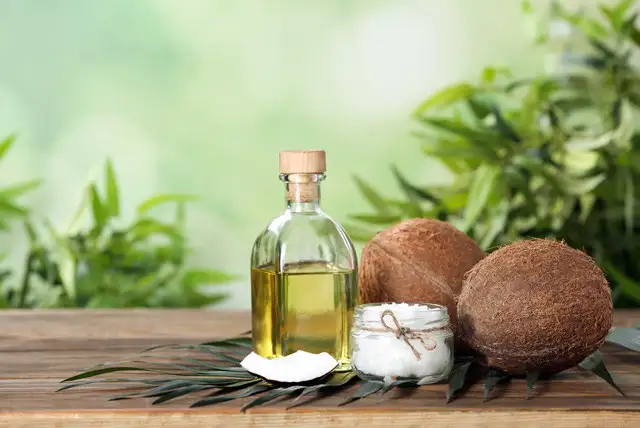Coconut oil has long been praised for its hair-nourishing properties, offering deep hydration, protection, and overall hair health improvement. From preventing protein loss to reducing hair breakage, coconut oil is a must-have in your hair care routine. In this comprehensive guide, we will explore the best ways to apply coconut oil to hair, expert recommendations, and the science behind its effectiveness.
Why Use Coconut Oil for Hair?
Coconut oil is packed with beneficial fatty acids, primarily lauric acid, which can penetrate deep into the hair shaft. According to Dr. Hadley King, a board-certified dermatologist in New York, "Coconut oil is one of the few oils that can actually penetrate the hair shaft, helping to protect and strengthen hair from within." This makes it a superior choice compared to other oils, which often sit on the hair’s surface. Dr. Iqbal Malik, a dermatologist from Pakistan, also highlights its antibacterial and antifungal properties, which can help combat dandruff and scalp infections. "Applying coconut oil regularly can reduce scalp irritation, promote hair growth, and enhance overall scalp health," he says.
Choosing the Right Coconut Oil

To reap maximum benefits, it’s crucial to select the right type of coconut oil. Virgin or extra virgin coconut oil is unrefined and minimally processed, retaining the most nutrients. Cold-pressed coconut oil is extracted without heat, preserving essential fatty acids and antioxidants. Organic coconut oil is free from harmful pesticides and chemicals, making it a safer option for hair care.
Step-by-Step Guide to Applying Coconut Oil on Hair
Before applying coconut oil, decide whether to use it on dry or damp hair. Dry hair allows better oil penetration, while damp hair helps lock in moisture. Ensure your hair is tangle-free by gently combing it. Since coconut oil solidifies at room temperature, warming it slightly makes it easier to apply. You can rub a small amount between your palms, place a bowl of coconut oil in warm water for a few minutes, or use a microwave for 10-15 seconds. For even distribution, divide your hair into sections. This ensures each strand gets coated adequately, especially for thick or curly hair types.
Dip your fingertips into the warm coconut oil and gently massage it into your scalp using circular motions. Focus on dry areas, dandruff-prone zones, and hair follicles to stimulate growth. Work the oil down the hair shaft to the tips, concentrating on the ends as they are the most damaged. Use a wide-tooth comb to distribute the oil evenly. Depending on your hair needs, leave it on for 30 minutes for a quick treatment or overnight for deep conditioning. Cover your hair with a shower cap after hair oil to enhance absorption.
To wash it out, use a sulfate-free shampoo to remove excess oil. Rinse with lukewarm water, avoiding hot water as it can strip natural oils. Follow with a conditioner for extra hydration.
How Often Should You Apply Coconut Oil?

The frequency depends on your hair type. If you have oily hair, applying coconut oil once a week is sufficient. Dry or damaged hair benefits from oiling 2-3 times per week. For curly or coarse hair, using herbal oil every other day as a leave-in conditioner can help maintain moisture and definition.
Coconut Oil for Specific Hair Concerns
Coconut oil nourishes the scalp and stimulates hair follicles, promoting growth. Massaging your scalp with coconut oil for 10 minutes daily can enhance circulation and encourage healthy hair growth. Its antifungal properties help eliminate dandruff, making it an effective remedy when mixed with tea tree oil and applied to the scalp. A small amount of coconut oil applied to hair ends can smooth frizz and add shine without making hair greasy. For deep conditioning, a hair mask made with two tablespoons of coconut oil, one tablespoon of honey, and an egg yolk can work wonders. Mix and apply the mask, leave it on for 45 minutes, then rinse thoroughly.
Potential Side Effects and Precautions
Although coconut oil is generally safe, some people may experience greasiness if used in excess, especially those with fine or thin hair. Conducting a patch test before full application is recommended to avoid allergic reactions. Proper shampooing is necessary to prevent scalp buildup, which can lead to clogged follicles and potential irritation.
Conclusion
Coconut oil is a versatile and powerful natural remedy for various hair concerns. With proper application and expert-backed techniques, it can help nourish, protect, and revitalize your hair. Whether used as a pre-shampoo treatment, leave-in conditioner, or deep conditioning mask, coconut oil remains one of the best ways to achieve strong, healthy, and lustrous hair. By incorporating these steps into your routine, you can unlock the full potential of coconut oil and enjoy healthier, shinier hair naturally. Remember to consult with a dermatologist if you have underlying scalp conditions to ensure that coconut oil suits your specific needs.
